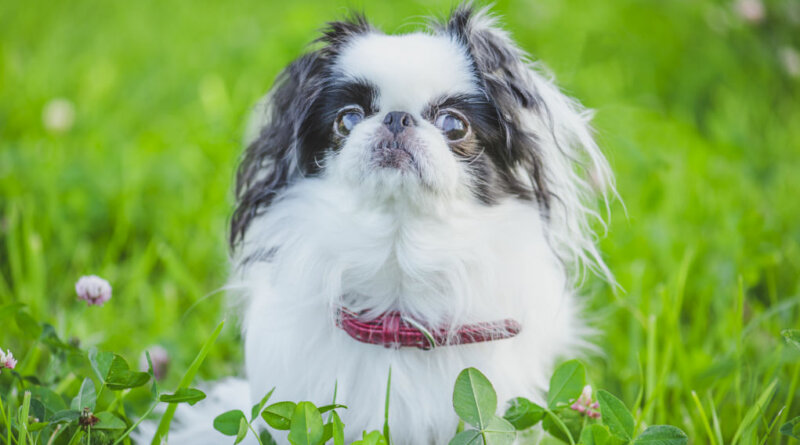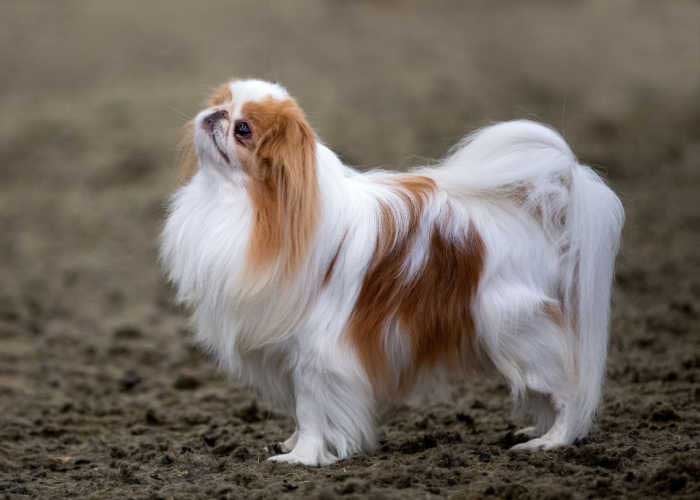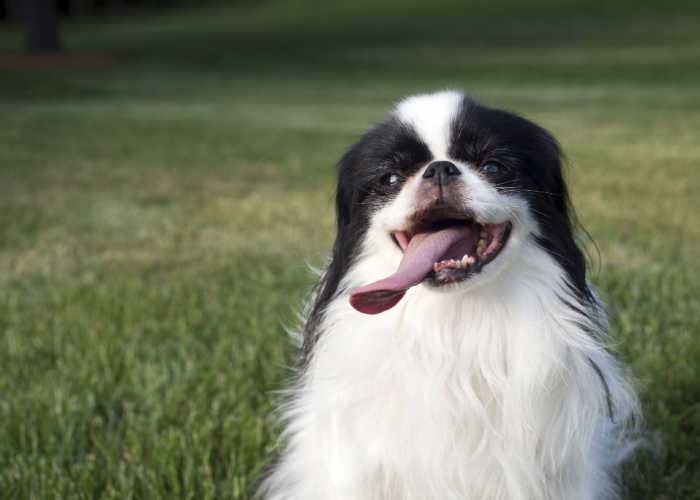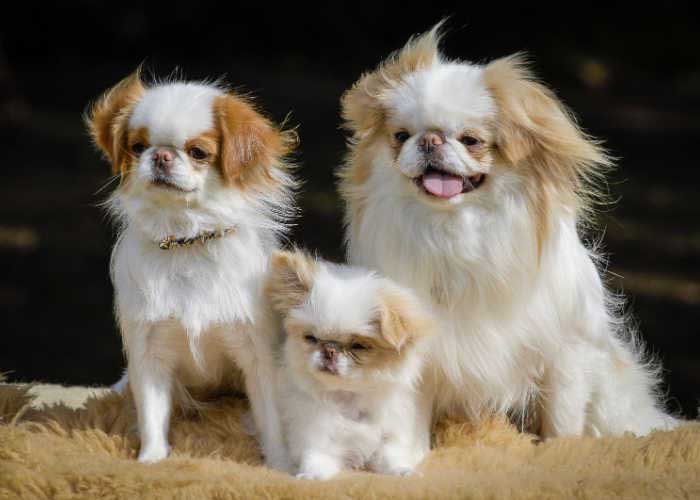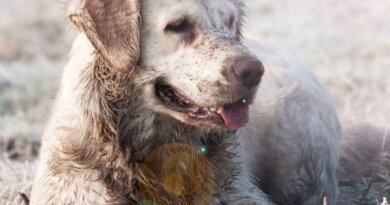Japanese Chin Dog Breed Profile – Top Dog Tips
The Japanese Chin dog breed is a charming companion dog with aristocratic bearing. Learn more about living with this toy breed!
This breed, also known as the Japanese Spaniel until 1977, is often described as a “cat-like” dog.
Aside from being a meticulous self-groomer, it is renowned for its climbing abilities as it prefers to rest on high surfaces.
An ideal lapdog, the Japanese Chin is sweet-tempered, playful, and graceful.
Hence, it is best suited for adults or older people who would match their calm nature.
Although somewhat independent, it is loving and intelligent whose sole purpose is to be a companion.
While it is content to lie quietly on your lap or curled up on a chair, this dog also enjoys playing games and running around like mad.
Prized as a companion for more than a millennium, the Japanese Chin dog was a popular member of the Chinese and Japanese imperial courts. It was in Japan that it developed its distinct look.
Today, the Japanese Chin breed is believed to be the ideal pet since it is gentle and affectionate. It thrives in any environment and is both dignified and goofy.
In 1888, the American Kennel Club recognized the breed. It ranked 105th on AKC’s list of the most popular dog breeds of 2021.
Japanese Chin Dog Breed Standard
Height and Weight
This breed grows up to 8 to 11 inches and weighs between 7 to 11 pounds.
Coat
The coat is long, sleek, and smooth that can be either black and white, red and white, or black and white with tan points.
Features
A “look of astonishment,” as some like to call it, is what the Japanese Chin’s huge head, short muzzle, and round, dark eyes convey them.
It has the exquisite, exotic appearance that is so typical of Asia’s regal pedigree thanks to the thick mane that drapes over the neck and shoulders and the plumed tail that arches over its back.
Japanese Chin Family Life
The Japanese Chin dog is affectionate with those it knows and loves.
Due to its heightened sense of awareness of its environment, it picks up on the emotions of the home’s residents and modifies its personality accordingly.
If this pooch lives in a solemn, quiet home, it will likely become reserved and quiet. But if it lives in a bustling home, it is likely to be lively and outgoing.
Although it can adapt to any living condition and do well in apartments, the Japanese Chin breed is not well-suited to living outside or in a kennel due to its small size and love of human company.
It prefers to be around other Chins but can still get along with everyone.
This pup may act a little distant from strangers at first but becomes a fun playmate until it gets to know them.
Due to its small stature, the Japanese Chin dog breed does not go well in homes with younger children because it gets easily hurt even with minimum force.
Like all breeds, no matter the size, always teach children how to treat dogs.
Japanese Chins can be great pals but no matter how friendly, you should never leave them all by themselves with a child.
Japanese Chin Dog History
The Japanese Chin dogs’ origins have been a subject of much historical controversy.
Some claim they came from China, while others believe them to have originated in Korea.
Various origin stories credit the arrival of the Chins to Japan between 500 and 1,000 years ago to Buddhist monks, Chinese emperors, or European traders.
But everyone agrees that the dogs as we know them now were developed by Japanese nobility.
By the middle of the 19th century, they were often offered as prized gifts to naval leaders or sold to traveling traders and sailors when Japan started engaging in international trade for the first time after more than two centuries of self-imposed isolation.
They were gradually introduced into Western nations as a result of this.
The exact date of the Japanese Chin breeds’ introduction to the United States is unknown.
They were once known as Japanese Spaniels when they arrived in the country.
The American Kennel Club identified them as Japanese Chin dog breeds in 1977.
Japanese Chin Breed Health
Although typically a healthy breed, the Japanese Chin can experience various health issues, such as cataracts, early-onset heart murmurs, and Legg-Calve-Perthes disease.
The Japanese Chin dog can be affected by progressive retinal atrophy, which is an eye condition that will eventually cause blindness.
It is a gradual loss of photoreceptors at the back of the eye but can be detected years before it happens through an ophthalmologist evaluation.
Another health problem you should be aware of is the inherited lysosomal storage disorder called GM2 gangliosides.
Hexosaminidase A, the enzyme that aids in the breakdown of certain carbohydrates in cells, is dysfunctional in affected dogs.
Your furry friend may also experience epilepsy, a neurological disorder that causes seizures.
Due to a condition known as patellar luxation, the kneecap may slip out of position while your dog moves. This results in lameness, which limits your pet’s mobility.
While shielding every dog from inherited issues is impossible, the danger can be reduced with the right treatment.
The majority of Japanese Chin breed live healthy lives, often until the ages of 10 to 12.
RELATED: Natural Treatment For Cataracts In Dogs
How to Care for Japanese Chins
Exercise
Even though this breed is not recognized as being among the most active, it is still crucial that your pooch gets the right amount of exercise.
It may prefer cuddling on your lap, but that doesn’t imply it won’t enjoy a stroll.
Once or twice a day, take your furry friend for a gentle 15-minute walk at a time.
It is preferable to keep your dog at home when trekking or jogging because it lacks endurance.
Because it requires little space to exercise, the Japanese Chin dog breed is the perfect pet for apartment dwellers.
Still, it will appreciate a decent stroll or, even better, a free gallop with other tiny dogs in a controlled dog park.
Training
Japanese Chins’ sole purpose throughout the breed’s history has been to charm, amuse, and soothe their people.
They were bred exclusively as companions for royalty.
These doggos respond well to constructive training techniques but become unresponsive at the first sign of harshness.
To sustain their interest, training sessions must be engaging and enjoyable.
Otherwise, they become disinterested and may shift their focus to something more entertaining.
They enjoy picking up new skills to show off to their loving audience.
But because of their reputation for stubbornness, teaching them may require a bit more patience and persistence than usual.
Despite their intelligence and desire to please, Japanese Chin dogs pick up things quickly but often do things their way.
Grooming
Japanese Chin breeds appear to be high-maintenance dogs due to their long, silky hair, but it is surprisingly simple to keep in good condition.
The coat does not typically mat, although it is best to constantly tend to it to prevent tangling. There won’t be any need for clipping or scissoring.
Depending on their environment, they may need to be brushed once a week and bathed about once every month.
Because they are known for having nails that grow quickly, it’s important to trim the nails regularly to keep them short and neat.
Check the ears for signs of infection. You may want to wipe them out to spot potential problems.
Brush the teeth daily to improve general health and breath.
Diet and Nutrition
Japanese Chin dog breeds should thrive on premium dog food, whether it is produced commercially or made at home under the guidance and consent of your veterinarian.
Watch their calorie consumption since they are prone to becoming overweight.
Treats are useful during training, but giving them in excess could result in obesity.
To choose a balanced diet, speak with your veterinarian to determine meal portions and suitable dog food based on your dog’s age, weight, and activity level.
Fresh, clean water should always be accessible.
Ideal Owner of Japanese Chin Dogs
The Japanese Chin is a house dog that was only ever bred for companionship.
It does well in apartments and even gets along with inexperienced fur parents.
If left outside for an extended amount of time, it will suffer. It also tends to experience separation anxiety since it dislikes being separated from its owners.
Thus, this breed is not a good choice if the family or owner is gone all day because it will be quite unhappy if left alone for even a short while.
The Japanese Chin dog is independent and sensitive, so if you want a dog to dominate, this is not the breed for you.
It also has a tendency for climbing, so you could be shocked to see your dog perched on the highest points in the house, inspecting its domain.
This fluffball prefers older owners or homes without small children since it dislikes being teased or engaging in particularly rough play.
FAQs about Japanese Chin Breeds
Does the Japanese Chin dog breed bark a lot?
The Japanese Chin breed rarely barks.
In fact, it is well-known for being excellent in condos or other multi-dwelling housing systems.
Is the Japanese Chin dog breed rare?
Also referred to as Japanese Spaniel, it is a relatively rare toy breed with an ancient and noble heritage.
It is distinguished by its broad, flattened face, wide-set eyes that often seem amazed, and long, floppy, feathery ears.
Do Japanese Chin dog breeds shed?
Although it gives the impression that it requires a lot of attention, the Japanese Chin dog breed is remarkably easy to groom.
You just have to brush it twice a week as it sheds on average.
Japanese Chin Dog Breeds: Summary
If you’re looking for dogs with a calm demeanor, Japanese Chins could be the right canine companions for you!
They have every trait a person would want in a companion dog.
With their owner’s best interests at heart, they are similar to having a best friend who will never fail to stay by you.
Give your Chin plenty of care and affection, and you’ll have a loving cuddle buddy for a lifetime.
So, are they the dogs that you desire?
People purchase Japanese Chin dogs without the ability to commit to the lifetime of these animals. If you want to bring a dog home, consider adopting one.
There are many Japanese Chin breeds in need of fostering.
Still, gather more information before getting a puppy to see compatibility with your lifestyle.
You may visit various breeders and see the dogs yourself. Find a reputable breeder who will show health clearances to prove that the dogs are clear of health conditions.
The Japanese Chin Club of America fosters and promotes purebred Japanese Chin breeding of high quality and works to safeguard and further the interests of the breed.
Members in every state will be your point of contact if you are considering adding Japanese Chin dog breeds to your home.
READ NEXT: Afghan Hound Dog Breed Profile
Related

